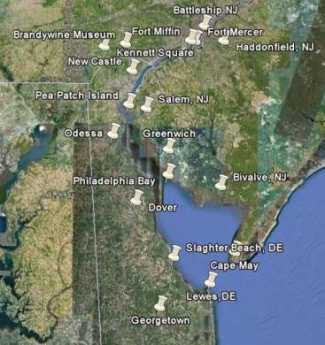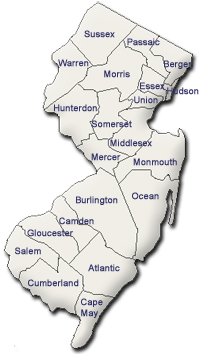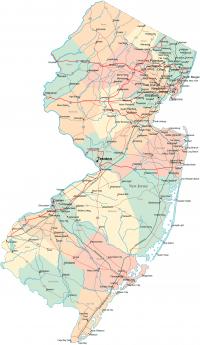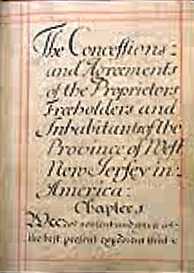Related Topics
Quakers: William Penn
Although Ben Franklin gets more ink lately, William Penn deserves at least equal rank among the most remarkable men who ever lived.
The Proprietorship of West Jersey
The southern half of New Jersey was William Penn's first venture in real estate. It undoubtedly gave him bigger ideas.
Historical Motor Excursion North of Philadelphia
The narrow waist of New Jersey was the upper border of William Penn's vast land holdings, and the outer edge of Quaker influence. In 1776-77, Lord Howe made this strip the main highway of his attempt to subjugate the Colonies.
Land Tour Around Delaware Bay
 Start in Philadelphia, take two days to tour around Delaware Bay. Down the New Jersey side to Cape May, ferry over to Lewes, tour up to Dover and New Castle, visit Winterthur, Longwood Gardens, Brandywine Battlefield and art museum, then back to Philadelphia. Try it!
Start in Philadelphia, take two days to tour around Delaware Bay. Down the New Jersey side to Cape May, ferry over to Lewes, tour up to Dover and New Castle, visit Winterthur, Longwood Gardens, Brandywine Battlefield and art museum, then back to Philadelphia. Try it!
New Jersey (State of)
 The Garden State really has two different states of mind. The motto is Liberty and Prosperity.
The Garden State really has two different states of mind. The motto is Liberty and Prosperity.
Revolution in New Jersey
Early, brief but significant.
Jersey

|
| Map of New Jersey |
Once you notice the oddity of salt water in the lower reaches of the Delaware and Hudson rivers, it gets easier to understand the current theory that southern New Jersey was once an island. Like Long Island, it was separated from the mainland by a sound, but in the Jersey case the sound silted up from Trenton to New Brunswick, creating a new peninsula of "West" Jersey by uniting the island with the mainland. The colony was named after the island of Jersey off the coast of England, a gesture for Sir George Carteret, who was given the American area out of gratitude for once sheltering the exiled royal brothers Charles II and James from Cromwell, in that other Jersey. Cape May was probably a second distinct island later joined to the larger one by the transformation of the silted ocean into the bogs of the Maurice River. Cape May started as a whaling community, populated by Quakers from New York and New England, who always maintained a social distance from the Philadelphia Yearly Meeting. The long Atlantic beaches of New Jersey now repeat the main geological process, with successive generations of barrier islands first heaved up by the ocean and then packed against the mainland, filling up the brackish bay. The cycle of forming and packing successive barrier islands takes about three hundred years before a new one starts. In a larger sense, the process consists of the former mountains of Pennsylvania crumbling into the ocean and then responding to wave action.
It's no mystery, therefore, why southern New Jersey is flat, broken up by turgid meandering streams which casually empty in either direction. The head of Timber Creek, which flows into Delaware, is only eight miles from the head of the Mullica River, flowing toward the ocean. During the Revolutionary War, the British found it too dangerous to sail up these winding creeks, since at any moment they might make a sharp turn and be facing a battery of cannon on the shore. An arrangement quickly grew up that buccaneers would build ships in the center of heavy oak forests and sail them out to Barnegat Bay, thence out one of the inlets of the barrier islands into the blue water. The financiers of Philadelphia, many of them with names now in the Social Register, would come from the rear, sailing up the Delaware River creeks, and walking the last mile or two to privateer headquarters on the Atlantic-flowing creeks. Auctions were conducted, in which the ships were examined, the captain interviewed, and the crew observed in target practice. If you bought a small share you would be rich when the ship returned; and if it never returned, well, you had to invest in a different one. New Jersey is indignant of the opinion that these privateers were mainly responsible for winning the Revolution, but given little credit for it. Many more British sailors were lost to the privateers than soldiers were lost to Washington's troops and the economic loss to Great Britain of the ships and cargoes eventually became serious. Since much of the profit from privateering was recycled into the American war effort by Robert Morris, the British found themselves facing an enemy much more formidable than just the ragged frozen troops at Valley Forge on the Schuylkill. Meanwhile, William Bingham was conducting a similar privateering operation in partnership with Morris but based on the island of Martinique, but that's another story.
In later centuries, the traditions and geography of the Jersey Pine Barrens suited themselves to smuggling and bootlegging during the era of alcohol Prohibition, and even after Repeal, high taxes on liquor kept bootlegging profitable. As late as the 1950s, there were divisions of FBI men prowling the woods of South Jersey, on the lookout for trucks carrying bags of cane sugar, or coils of copper tubing. After housing developments started to invade the forests, the hardball politics of South Jersey reflected a Mafia culture thought more characteristic of South Philadelphia. Near Vineland and Atlantic City, it isn't just a culture, it has the accent, because it also has some of the ancestry.
REFERENCES
| New Jersey, A Historical Account of Place names in the United States: Richard P. McCormick: ISBN-13: 978-0813506623 | Amazon |
Originally published: Monday, June 26, 2006; most-recently modified: Wednesday, May 22, 2019
| Posted by: kimmer | Aug 25, 2012 4:00 PM |

Dear Dr.,
Can you please add the rest of this article to the page? It ends at the second paragraph like so:
"invest in a different one. Robert Morris once confided that one ship which returned would be so profitable it could pay for three or four ships which were lost. New Jersey is indignantly of the opinion that these privateers were mainly"
I enjoy your articles very much. I envy your writing skills.
Thank you,
Kim Paterson